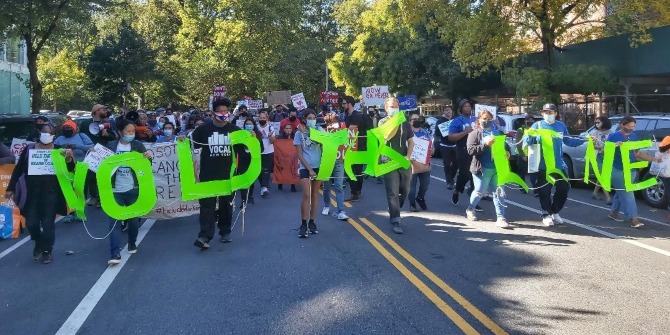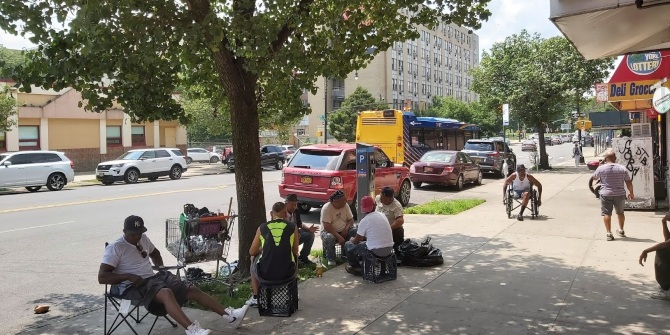 Following President Biden’s first State of the Union address this week, Glyn Robbins writes that while the speech had touches of authenticity and empathy towards the struggles of working-class people, Biden’s inability to push his policy agenda forward means his words are ultimately empty.
Following President Biden’s first State of the Union address this week, Glyn Robbins writes that while the speech had touches of authenticity and empathy towards the struggles of working-class people, Biden’s inability to push his policy agenda forward means his words are ultimately empty.
In-between innumerable standing ovations (I stopped counting at 40!), President Biden’s State of the Union on Tuesday night was an almost desperate appeal to a divided nation. Against a background of a war in Europe, and a pandemic and socio-economic volatility at home, POTUS said “we’re finally together again: we’re going to be OK”. That’s wishful thinking.
Despite his sometimes-stumbling delivery, it’s hard not to warm to Biden’s common touch. Even allowing for America’s special propensity for sentimentality, when he speaks about personal loss and the struggles of working-class people, it rings true. The problem is, more than a year into his administration, the 46th President’s policy agenda is holed beneath the surface.
At times, it felt the speech was directly aimed at Senators Manchin and Sinema who, from within his own Democratic Party, have torpedoed Biden’s potentially transformative “Build Back Better” package of social welfare spending. He repeatedly appealed to his Congressional opponents to help him “get this done” and deliver on pledges like cutting prescription and childcare costs by taxing the rich.
But the real target was Trump supporters. The obviously choreographed chant of “USA! USA!” from the Capitol floor, combined with repeated references to “buy American” confirmed the enduring force of populist patriotism in the nation’s politics.
With mid-term elections looming in November, Biden’s attempt to regain credibility with feel-good rhetoric can’t disguise the deep fissures in US society. I watched the address thinking about the people in the Bronx I spent six months with last year, who now face a cost-of-living crisis that could culminate in them losing their homes. Like millions of other working-class Americans, I suspect they would have met the State of Union with a shrug of indifference.
In some ways – and not just because of his age – Biden is a throwback. His tributes to industrial trade unions and communitarian values, although they are more left-wing sounding than most UK politicians would utter (including Labour Leader, Keir Starmer), suggest a misplaced nostalgia, captured by his call for America to be, once again, a “Field of Dreams”.
The reality, which Biden partly acknowledged, is that half a century of neoliberalism has allowed a chasm to open between the lives of most Americans and those of the wealthy in whose interests the government now operates as never before. Sadly, nothing Biden said on Tuesday suggests he is capable of presiding over anything other than a state of disunion which, unless there’s fundamental change, will lead to political and environmental catastrophe.
- Featured image: This is flying over the IOOF graveyard i…” (CC BY-SA 2.0) by Rich Anderson
Please read our comments policy before commenting.
Note: This review gives the views of the author, and not the position of USAPP– American Politics and Policy, nor of the London School of Economics.
Shortened URL for this post: https://bit.ly/3hByG9p
About the author
 Glyn Robbins – LSE Department of Sociology
Glyn Robbins – LSE Department of Sociology
Glyn Robbins was born in London and has worked in housing since 1991, when he was a student of Professor Anne Power on the LSE’s housing Masters course. In 2013 he completed a Ph.D in planning and urban policy. Since 2017, he has helped support students on the LSE’s Cities Programme and became an LSE Visiting Fellow in 2019 and a Fulbright Scholar in 2020/21. He also manages a north London council estate. Glyn’s writing about housing and urban policy has been widely published and he has frequently been interviewed by the media on the subject. In addition to his professional and academic involvement, Glyn is a long-time housing campaigner.







What bad happened in the century of neoliberalism?